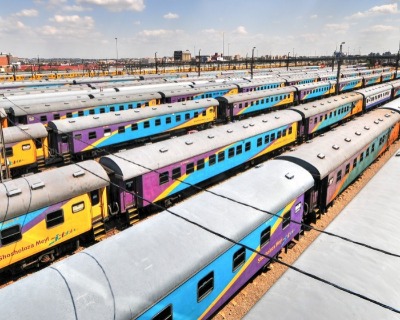All aboard for African railway projects?
Rail projects have the capability to change the face of the African continent for both freight and urban passengers. But, argues Jonathan Bell, proper planning of viable rail links is essential if they are to find the right backers and mix of financing.

It has been suggested that the $4 billion Addis Ababa-Djibouti freight railway built by China was poorly executed with planning ‘downrght inadequate’ and costly. Naturally, this also leads to a sharp focus and questions on other Chinese projects across Africa in terms of project planning, costs and overall return and debt repayments for African governments.
Of course, this is certainly not a concern which hasn’t been aired before. What is new though is the urgent need for a proper evaluation of rail transportation for both urban and freight transportation in many African countries. And, given the geography and land-locked nature for many countries some of these discussions ought to be pan-African.
At a Belt and Road Infrastructure (BRI) financing forum in Hong Kong earlier in October, Sinosure chief economist Wang Wen noted that lessons should be drawn from the poorly planned Addis-Djibouti railway that was inaugurated early this year but has already had to restructure its debt because of underuse caused by power shortages.
As recently reported in the South China Morning Post, Wen said the mistakes of that railway project has cost China’s Sinosure close to $1 billion in losses. Sinosure provided payment guarantees on the project. He also is reported to have stated: “Ethiopia’s planning capabilities are lacking, but even with the help of Sinosure and the lending Chinese bank it was still insufficient.”
The 756-km Addis-Djibouti railway, Africa’s first cross-country electric railway, was built by China Railway Engineering and Construction Corporation and the China Railway Group and backed by $3.3 billion of loans from the Export-Import Bank of China (China Exim). The loans are carried by the Ethiopian and Djibouti governments, with 85% of the Ethiopia portion and 70% of the Djibouti portion funded by loans from China Exim.
The Addis-Djibouti railway fits into the overall BRI map which links trading routes between Asia and Europe and Asia-Africa-Europe. In this case the railway gives landlocked Ethiopia sea access through neighbouring Djibouti. It is perhaps also interesting to note that Djibouti is the site of China’s first military base outside China.
But the financing concerns, and apparently losses, on this railway project are highly indicative of the vital need for proper project planning and preparation, and evaluation for economically viable projects. As part of this makeup, freight rail projects that are most likely to succeed are those linked to natural resource development particularly involving export revenues, and other freight projects where the private sector has a stake. Of course, when it comes to urban rail networks and mass rapid train systems in developing economies this may require some different and often difficult considerations – such as the question of fare concessions or subsidies.
But looking at other major rail projects in Africa where China has been highly instrumental, we do not have to go too far to see another very recent example where the development and delivery of the project has been somewhat controversial.
In Kenya, mid-2017 saw the launch of the Mombasa-Nairobi standard gauge railway (the so-called Madaraka Express). This is another project which fits in with the overall BRI plan. The 483-km long Mombasa-Nairobi line cost around $4 billion, once cost overruns were calculated into the final equation. The line was funded 90% by a loan from China Exim and 10% by the Kenyan government. The financing has come under a considerable amount of criticism largely related to the various cost increases of the project, but also from allegations of corruption on the deal.
The primary contractor of the Mombasa-Nairobi line is the China Road and Bridge Corporation (CRBC) under the China Communications Construction Corporation.
The Madaraka Express is supposed to be part of a much bigger rail plan, whereby it could eventually link Kenya with Tanzania, Uganda, Rwanda, Burundi, and even South Sudan and Ethiopia. But that is estimated to be a $13 billion project. And given the current debate about project costs and increasing government debt, the go-ahead for that project extension seems a very long way off, if not a dream.
For anyone who is a bit of a rail junkie like me, one important element in my book at least, is that both these railways were built using standard gauge track. Why is this important? Well, the truth of the matter is that across Africa the continent is littered with various narrow gauge railway systems which are largely remnants of a colonial past. To carry large volumes of freight, in particular, standard gauge and some form of pan-African standardisation would be preferable.
Further useless information for railway nerds is that some 50 years ago the country with the largest railway network in Africa was……Sudan! Yes indeed, that country had more than 5,000 km of track. Unfortunately, very little of that is left in operation today. There are plans to re-develop the Khartoum-Port Sudan railway, a 782 km link. Both China and South Korea have been in negotiations with the Sudanese government about the project.
One sub-Saharan country crying out for railway network modernisation on a massive scale both with freight and passenger transportation is Nigeria. Demand is massive. Back in 2016 it was estimated that Nigeria needed in the region of $160 billion for immediate road and rail transportation projects. The country’s rail system is also further complicated by the fact that it has various-sized rail gauges, but it is not clear exactly where there will be any rationalisation on this issue. Nigeria desperately needs a modern railroad that will ease movement of freight and passengers across the country.
China of course has already been involved in Nigerian rail projects – most notably with the Abuja-Kaduna rail line, which is the first phase of the Lagos-Kano standard gauge railway. The Abuja-Kaduna segment is already complete and services commenced back in July 2016. The entire project, which was awarded to the China Civil Engineering Construction Corporation (CCECC) way back in 2006, is estimated to cost in the region of $8.3 billion. In 2016 work began on the Lagos-Ibadan segment of the Lagos-Kano line. China Exim is providing a $3.5 billion loan. At what speed this project progresses overall remains to be seen.
The development of the Lagos rail mass rapid transit system is another mega project which will ultimately have a massive impact on this often grid-locked city. The new rail system will comprise of seven lines. This project is part of the Strategic Transport Master Plan which has been proposed to improve infrastructure in this densely populated region. Lagos state government is involved in the financing, but not the national government, by all accounts. CCECC was contracted to build the first line – the Blue Line. The project faced many delays, which included changes on the rolling stock order from the US to China. Funding negotiations for the Red Line apparently took some eight years!
More recently, rail developments in Nigeria have seen other rail companies coming into projects.
In mid-2016 the Nigerian minister of transport, Rotimi Chibuike Amaechi, said that General Electric (GE) would invest $2 billion in the country’s rail projects. He also said that the government was in search of public-private partnership (PPP) funding in the Nigerian transportation sector. At the time, he said: “The company [GE] is going to bring in over $2 billion into the Nigerian railway sector, in which they are going to revive the Lagos-Kano narrow gauge and revive the Port Harcourt-Maiduguri narrow gauge by private investment.”
Amaechi also said: ‘’We are going to invite as many private investors as possible to see how they can assist the country achieve its rail projects. If the government takes the Lagos-Kano and takes the Lagos-Calabar, we expect the others to be PPP funded. We believe that people know how big the Nigerian market is and that once you invest your money, the chances are that you will recoup that money, whether by freight or by passenger transportation.”
In May 2017, the Nigerian government awarded preferred bidder status to an international consortium for a $2.7 billion narrow gauge concession to revive the Port Harcourt-Maiduguri line. The international consortium is made up of General Electric, Sinohydro of China, Transnet of South Africa and APM Terminals of the Netherlands. This is a new approach to rail projects and the funding of those in West Africa, in particular, and will be an interesting development to keep a close eye on.
Given the importance of the development of rail networks in Africa and the overall lack of investment or support so far from Western governments, it is inevitable that China will continue to play the leading role in many, if not most, rail projects. But, there are some changes afoot, and we can expect to see other Western and Asian companies coming in on mass rail transport networks and viable freight routes. Keep watching for that changing African rail map!
Exclusive TXF essential subscriber content:
Post-Brexit infra investment: Taking the blindfold off
While UK politicians blindly follow the result of a referendum tainted by misinformation, those at the forefront of infra finance in the country discuss the reality of Brexit and what it will mean for future project development in the UK.
Shop talk: ING Capital looking through new ECA windows
Following a tightly priced UKEF-backed deal in the aviation sector this month, TXF spoke with Gemma Bae, head of structured export finance at ING Capital, to discuss the bank’s growing ECA portfolio. From satellites and sustainable healthcare financings in Asia to telecoms deals in LatAm, the bank looks set for an even busier deal pipeline in 2019.
Commodity debt: How green is an ESG-linked greenback?
Gunvor and ECOM have returned to the market with debut sustainability performance-linked loans – but how sustainable are these structures and how are they policed in a global commodity market notorious for opaqueness?
Revisiting the IFC Global Trade Liquidity Programme
Citi extended its participation in the IFC's Global Trade Liquidity Program (GTLP) this summer, almost a decade after its inception. TXF spoke with John Ahearn, global head of trade at Citi Treasury and Trade Solutions, about the importance of the $1.2 billion risk sharing facility for trade in emerging markets.
FEX: The London chapter
Future of Export Finance (FEX), a new platform aimed at transferring knowledge and talent to the younger generation of the export finance industry, has opened its second chapter in London. And, in an industry with an ageing demographic, the initiative has some smart ideas on how to breath new life into the ECA community.
Expert opinion: Trade financing needs a strategic vision, now
A call to action to all trade finance professionals to raise their heads and champion sustainable trade, inclusion and its potential positive role in global security. It’s time to take a strategic view.
What to expect in the coming trade tech revolution
With Sibos 2018 underway, Nancy Amert, director of CGI’s Trade Innovation Lab, and Rory Kaplan, director and offering manager of trade and supply chain at CGI, share their thoughts on how technology is impacting trade finance.
The news you thought you had but you don’t…
Umm al Hayman Wastewater contract signed
Project sponsors WTE Wassertechnik and International Financial Advisors, and procurers Kuwait Authority for Partnership Projects (KAPP) and the Ministry of Electricity & Water (MEW) have signed the 25-year concession contract for the Umm al Hayman Wastewater PPP project.
Dognin joins La Banque Postale AM infra team
La Banque Postale Asset Management has appointed Barthelemy Dognin as an investment manager in its project finance and infrastructure debt team.
Kansas City Airport to reach FC in Q1 2019
An Edgemoor-led consortium is expected to reach financial close in the first quarter of 2019 on the $1.5 billon Kansas City International Airport redevelopment project in Missouri.
Ship Finance International closes sale-and-leaseback
Ship Finance International has raised a $215.5 million term loan to finance the sale-and-leaseback of three large container vessels – the Thalassa Doxa, Mana and Tyhi – to Financial Products Group.
Zennor Petroleum signs Finlaggan gas field financing
Zennor Petroleum has signed a $170 million senior secured term loan to finance the ongoing development of its 100%-owned Finlaggan gas field in the North Sea.
Ravago ups credit facilities
Bookrunning mandated lead arrangers (BMLAs) ING and KBC have closed a €1.65 billion ($1.88 billion) multi-currency secured syndicated credit for Ravago (a Luxembourg-based provider of raw materials to the plastics, rubber and chemicals industries).
Hill Top Energy Centre gas plant to close by year-end
Ares-EIF is expected to reach financial close by year-end on the funds backing the development of the 620MW gas-fired Hill Top Energy Centre in Pennsylvania.
Baker appointed head of Energy & PF at Societe Generale
Allan Baker has been appointed a new role as head of Energy Advisory & Project Finance at Societe Generale while also retaining his position as global head of power.
UK's Cory Riverside Energy refi priced
Cory Riverside Energy closed a £550 million ($713.6 million) syndicated facility on 22 October to refinance the outstanding 2017 debt package stapled to the 66MW Riverside Resource Recovery energy-from-waste (EfW) plant in the UK.
Natixis on IMO 2020 and the implications for the oil market
Natixis has released a short video for its expected and predicted implications of IMO 2020 – a regulation implanted by the International Maritime Organization (IMO) that targets sulphur levels in marine fuel.
F2i signs long-term acquisition facility for RTR solar portfolio
F2i has signed the long-term acquisition facility backing its €1.3 billion ($1.5 billion) purchase of the 334MW RTR solar PV portfolio from Terra Firma.
Rutas del Loa concession financing signed
ISA Intervial Chile has reached financial close on a $300 million loan for its UF7.3 million ($313.3 million) 136 km Rutas del Loa road project.
UK's Jedburgh Learning Campus to close this week
Sponsors of the Jedburgh Intergenerational Learning Campus project in Scotland – Hub South East Scotland, Scottish Future Trust and Dalmore Capital – are set to reach full financial close this week on a £35 million ($46 million) loan provided by NordLB to fund the scheme.
Aluar secures EKF-backed funding for El Llano III
Argentine aluminium producer Aluar Aluminio Argentino (Aluar) has secured a 15.9-year $56 million loan from EKF to finance phase III of its 60MW El Llano wind farm in Argentina.
Bedwood joins Societe Generale as MD of London RBL team
Stephen Bedwood has joined Societe Generale as a managing director in the London reserve-based finance (RBF) team.
Baihas Baghdadi joins Network Steel Resources
Baihas Baghdadi has joined Network Steel Resources as chief executive officer, International Division, based in Madrid.
Jawa 1 reaches initial close on ECA/DFI-backed facility
PT Jawa Satu Power (JSP) and PT Jawa Satu Regas (JSR) have reached initial close on a $1.312 billion DFI/ECA-backed facility to finance construction of the 1,760 MW Jawa 1 combined-cycle LNG-to-power project in West Java.
ECOM Agroindustrial signs debut sustainability-linked RCF
ECOM Agroindustrial has signed a $650 million multi-currency sustainability-linked revolving credit facility (RCF).





